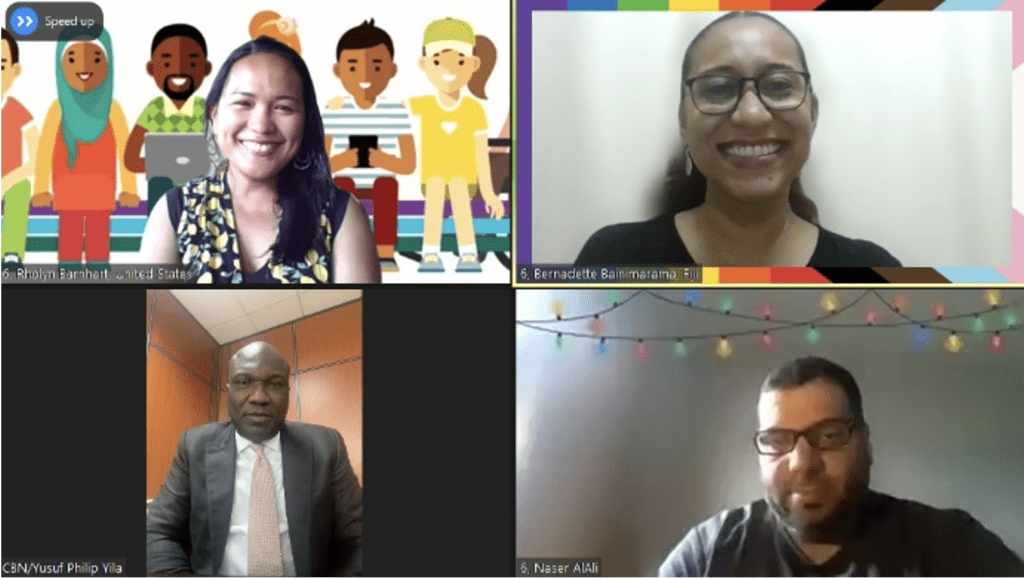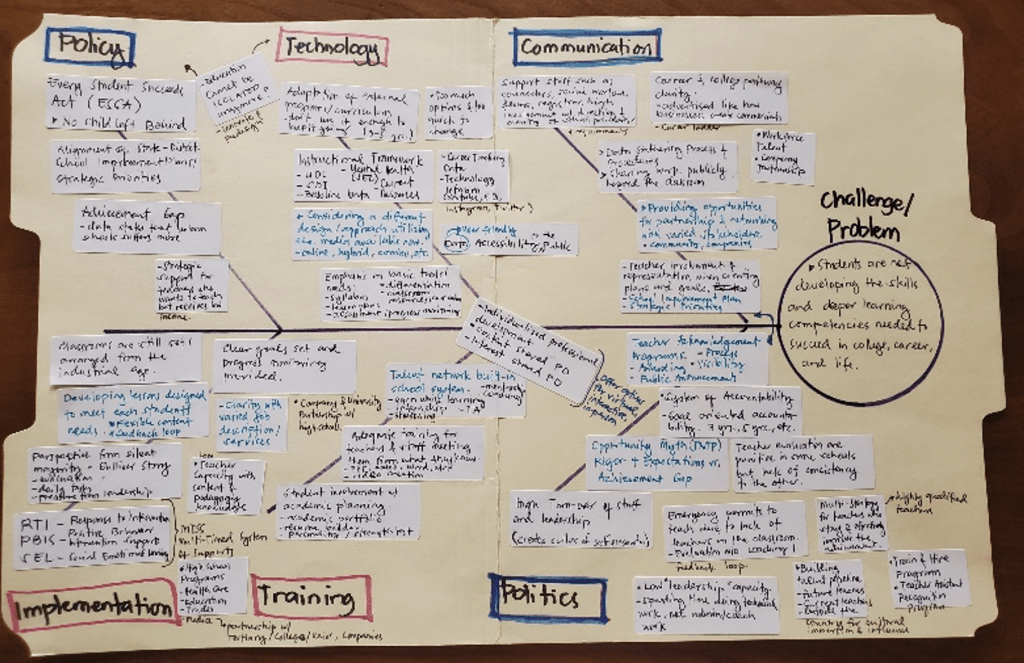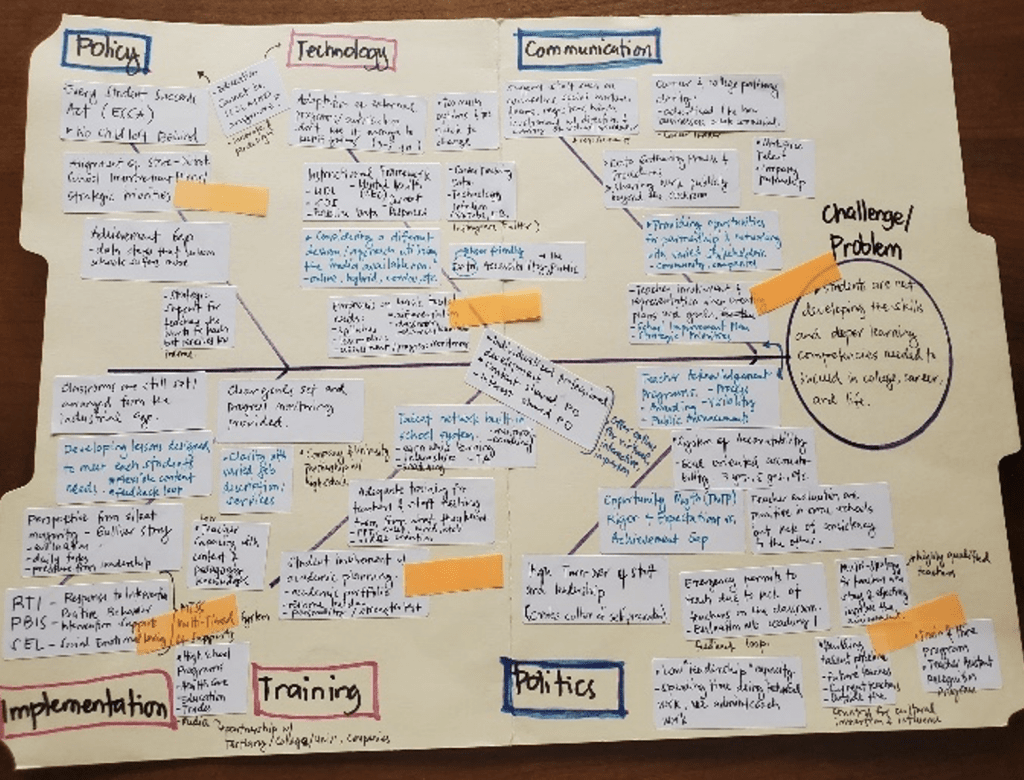Guest blog written by Rholyn Barnhart
I was born in a very small town in the Philippines. Majority of the source of income in our town relates to fishing and trading goods. My family is one of the many families who wanted to go out of our current state of life – working just to survive. My mom’s hope is for my siblings and I to earn as much education as we can and read so we understand… It has been my dream to go to Harvard.
When I signed up for the course, I was in a great deal of frustration. I am starting to develop revulsion in “the system” and an internal chaos to my preferred profession. I thought, I have been teaching for almost eighteen years and have moved from country to country, yet the problem in the education system seems to revolve around political, legal, organizational, or personal authority gaps. For that reason, I started reaching out to people in “the system”. I was not aware that some authority figures follow a very rigid communication protocol. Before this course, I have an initial assumption that when an authority figure is tasked to function in a certain role, they would welcome ideas that would potentially provide a positive influence on authentic student outcomes. My assumption was wrong. It led me to a state of hopelessness, and I felt that I was on a ‘big stuck’.
My implementation challenge is around Multi-Tiered System of Supports (MTSS) – a data driven approach that centers whole child metrics in responding to student’s individualized needs. It aims to ensure that the newly revised educational law in 2015, Every Student Succeeds Act (ESSA), promote innovation, flexibility, transparency, accountability, and to reduce burden, while maintaining essential protections for all students.
Before I signed up for this course, I have been reading and compiling plenty of research, playbooks, guidelines, handbooks, and policies both international and local resources. The more I read, the more I am trapped. I felt that the mythology about Sisyphus felt the same way I felt. On the other hand, I did not stop. I thought that there should be a way to make ‘progress’ somewhere, somehow. Then, my Implementing Public Policy journey began. I felt hopeful again to explore and adapt the Problem Driven Iterative Adaptation (PDIA) toolkit – A DIY Approach to Solving Complex Problems. Through this process, I have learned that this journey is just the genesis of what is yet to happen.
Reflecting on our initial weeks, we were tasked to construct, deconstruct, and sequence our problems. The first section – Constructing a Problem, looked as if it was easy to create because everyone has a problem! I was proven wrong… After repeatedly utilizing the question, “Why does it matter?” five times, then asking three more questions: Who needs to care more? How do we need to get them to give more attention? and What will the problem look like when it is solved? My pile of resources I personally gathered is multiplied to a number that I cannot quantify. I then paused and think that it’s just the beginning, yet I have an ocean to swim!
Furthermore, we were tasked to deconstruct our problem using the “5 why- technique” which allows us to identify multiple root causes and to further break down each cause into sub-causes. Not only that, we proceed to using a fishbone or Ishikawa diagram to visually represent our deconstructed problem. In this part of the journey, I was sleepless. I have a notebook and pen with me wherever I go. I wake up before the sun rises and catch the birds getting ready to start their day. I listen to their noises while I look at the deconstructed notes I gathered thus far. A sip of coffee on the side, read more resources to understand ‘the problem’, then off I go to another day of virtual work.
Then came the third step in doing PDIA, sequencing our deconstructed problem. We learned how to use the triple-A change space analysis to identify how much change space we have in each sub-causes of our fishbone. One of the many lessons that landed well to me in this part of the journey is ‘premature load bearing’. I reflected and asked myself if the problem I chose was the cause of pre-mature load bearing that had ripple effect to many other causes in the fishbone? If so, how can I clarify both my internal and external explanation to make sense of Multi-Tiered System of Supports as one of the many reform initiatives in our local schools, yet it became the problem? Which of the change space should I grow?
Before ‘Crawling the Design Space’, the school year 2021-2022 is on the onset of its planning for opening in-person or potentially online in our state. Thus, many initiatives are perceived to pause and/or stop indefinitely to focus on the current need. Perhaps every local schools in this time of the year, reassess their needs. This was also the phase in my journey that my family needs to reassess our need. Therefore, we made a huge decision to move out of the state.
I remembered Prof. Matt and Lant mentioned about the juggling analogy. I was juggling at least five major balls – work, mother of two little girls, wife of a husband that was relocated out of state, Ed.D. program, and my IPP class. I decided to drop the ball for my work initiative and keep the juggle for my family’s need. This was also the time that we were exploring and reflecting with the 4-P (Perception, Process, People, Projection) with Rob Wilkinson. I love this phase of our learning because I found my soul back again.
Before I migrated here in the United States, I was a dissertation away from my Ph.D. in Public Administration. A scholarship grant from National Institute for International Education (NIIED) in South Korea. This grant was my passion to seek to understand policies in the education system. This grant was a result of years of hard work and wondering of a little girl from a remote village in the Bicol region. This little girl experienced the martial law in the Philippines. This same girl wondered what education does, to give ourselves freedom from anyone’s current socio-economic status. I dropped this ball eight years ago due to high stress and my mental health was on a brink of collapsing.
Yet again, the little girl inside a woman’s body has been searching for the connection of education to free ourselves from the control freak society; and understand the interchanges of power around us. The interchanges of power that seem to lure many people and become the blinder to help other people around. The PDIA approach helped this little girl in a woman’s body to understand that this is the reality of the land. Authorizing environments are commonly fragmented, and difficult to navigate. This program helped me identify various authorization needs, how to find them, and how to grow my own authorization (formal/informal) over time.
My IPP family not only offered me intellectual support to grow but personal support. A support that no money could pay for. I did not expect that an Ivy League school will extend this kind of grace to my own family. More than any of the information I learned, I will carry a grateful heart. I found a psychologically safe environment for me to fall and get up. A place where we can try, learn, iterate, and adapt. We learned how to scale through diffusion. This diffusion engages multiple agents across sectors and organizations to ensure reforms are viable, legitimate, and relevant. I have fallen before but was not offered to get up. Now, I have IPP family.
I have to admit that I was pre-maturely loading myself with initiatives and reform that I don’t have the muscle to carry as of yet. I was shooting for the moon, yet I don’t have a vehicle to get there. There was a serious challenge ahead that I thought advocacy would be able to suffice but I was wrong. I was desperate to carry the message to influence the people around me, but I need more than that… I need the PDIA approach and a community of practice to help each other explore complex and ‘wicked hard’ problems. Like what the toolkit mentioned – One day, perhaps, something like PDIA will be the normal and normative way of engaging with complex developmental challenges. As Albert Hirschman so aptly called “a long voyage of discovery.”
Therefore, this journey is indeed just the genesis of what is yet to happen. But I will keep moving on… I will keep rollin’, rollin’, rollin’ on the river… I said, rollin’, rollin’, rollin’ on the river… (with my singing voice)



This is a blog series written by the alumni of the Implementing Public Policy Executive Education Program at the Harvard Kennedy School. Participants successfully completed this 6-month online learning course in December 2021. These are their learning journey stories.
